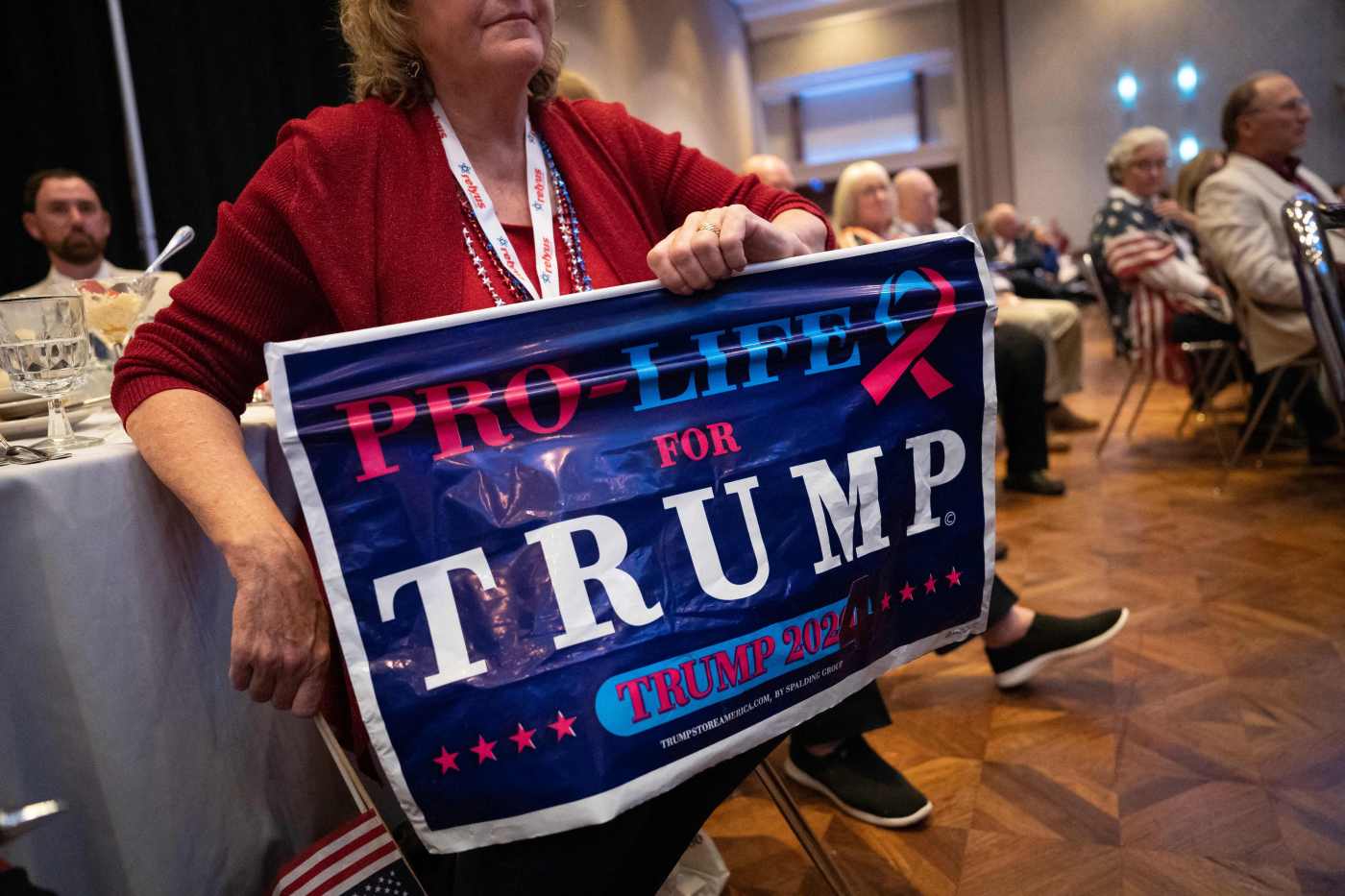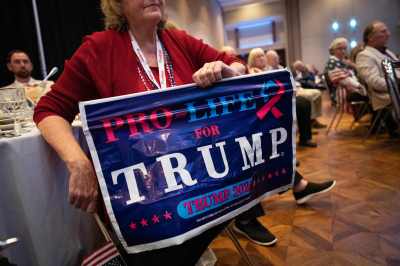For nearly two decades, evangelical leader Bob Vander Plaats has played an influential role in Iowa GOP elections. He backed the winners of each of the last three seriously contested Iowa GOP presidential caucuses—Mike Huckabee in 2008, Rick Santorum in 2012, and Ted Cruz in 2016—and it’s fair to say his support was decisive for both Santorum and Cruz. In 2020, Vander Plaats demonstrated his influence could even help oust GOP incumbents when Randy Feenstra, a Republican backed by Vander Plaats, defeated nine-term congressman Steve King in a primary.
But in the 2024 presidential contest, Vander Plaats’ late-November endorsement of Ron DeSantis hasn’t seemed to move the needle in the Florida governor’s direction at all. To be fair, nothing has—not an endorsement from Iowa GOP Gov. Kim Reynolds, not DeSantis’ visits to all 99 counties in the state, and not the fact that former President Donald Trump has actively attacked Florida’s heartbeat law as “terrible” when an overwhelming majority of Iowa Republicans support a nearly identical law in their state.
In a September interview on NBC News’ Meet the Press, Trump said that DeSantis’ signing of a bill that generally prohibits abortion later than six weeks of pregnancy, with several exceptions, was “a terrible thing and a terrible mistake.”
DeSantis and his supporters have sought to use the comments to drive a wedge between Trump and his voters in Iowa, to little effect. Asked during a CNN town hall last week whether he thought Trump was pro-life, DeSantis was surprisingly blunt. “Of course not,” he said. “When you’re saying that pro-life protections are a terrible thing, by definition, you are not pro-life.”
Vander Plaats agreed, telling The Dispatch in a phone interview this week: “It’s one thing to appoint three justices that lead to the overturning of Roe v. Wade, but if you’re critical of the heartbeat bill … how do you call yourself pro-life at that point?”
“I think he’s very pro-‘Let’s make a deal,’” Vander Plaats added. “‘Hey, listen, do you back me? I’ll support you once I’m in office’—like a transactional leader would.”
Trump’s campaign has, according to the Washington Post, “assured some conservative leaders in private meetings that the former president only criticized strict state abortion laws as a means of attacking” DeSantis. But Marjorie Dannenfelser, president of the Susan B. Anthony Pro-Life America, isn’t convinced. “I haven’t gotten any reassurance on that,” she told The Dispatch in an interview on Tuesday. “He should recant.”
But when Trump had the opportunity publicly to do just that at a Fox News town hall Wednesday night, he doubled down on his criticism of state heartbeat laws instead. “If you talk five or six weeks, a lot of women don’t know if they’re pregnant in five or six weeks,” he said when asked by a voter to reassure her of his commitment to the pro-life cause. “We still have to win elections.” Trump suggested that DeSantis’ slide in the GOP primary polls was partly due to his signing of Florida’s heartbeat bill, a spurious claim that fails to account for the fact that such laws are still popular with a majority of Republican voters.
Leading in Iowa by more than 30 percentage points, Trump clearly feels safe positioning himself on the issue for not just New Hampshire’s more moderate Republican electorate, but a general election against President Joe Biden. His triangulation, however, is doing serious damage to the pro-life cause by persuading some voters to oppose heartbeat laws.
In October 2022, a Des Moines Register poll conducted by J. Ann Selzer found that Iowa Republicans backed the state’s heartbeat law 70 percent to 24 percent, and 67 percent of likely GOP caucusgoers in August 2023 still supported the law or thought it was too permissive. But just a couple months later, after Trump trashed the Florida law, another Des Moines Register poll asked likely Iowa caucusgoers if they agreed or disagreed with Trump that “passing a 6-week abortion ban like Iowa’s was a ‘terrible mistake.’” Only 52 percent of Republican respondents disagreed, while 36 percent agreed.
Trump would only need to persuade a small number of voters that such laws are “terrible” in order to play a decisive role in overturning one of the most important pro-life laws in the country. There will be a referendum on Florida’s ballot this year over whether to enshrine an expansive right to an abortion in the state’s constitution, and while the anti-abortion side has generally been routed in state referenda since Roe was overturned, the threshold to pass constitutional amendments in Florida is 60 percent—a level of support that’s difficult to reach in a battleground state. In 2022, for example, a similar amendment passed in Michigan with 56.7 percent of the vote, and it’s entirely conceivable that Trump’s attacks on heartbeat laws will help put Florida’s proposed amendment over the top in November. Trump has “given a gift to the left to weaponize that against pro-lifers, and that’s wrong,” DeSantis said at a CNN debate with Nikki Haley on Wednesday night.
Mainstream GOP governors, such as Brian Kemp in Georgia and Kim Reynolds in Iowa, have demonstrated that Republicans can sign heartbeat bills into law and still cruise to re-election. But if Trump’s stance on the issue is rewarded with a decisive victory in the 2024 GOP primary, that could change the calculus for other Republican officials going forward.
Vander Plaats, however, insisted Trump is singular and other GOP politicians wouldn’t get away with similar departures from pro-life orthodoxy. “He does get by with stuff others don’t get by with,” he told The Dispatch. “It doesn’t stick to him where it would stick to another candidate.” In Vander Plaats’ view, Trump’s evangelical base has stuck with him out of a deep sense of loyalty. “He disrupted things,” Vander Plaats continued. “He led on issues we care about, so we’ll be loyal to him. And then when they see a system weaponized against him, they kind of feel like it’s weaponized against them as well.”
Still, Vander Plaats insisted that Trump—now registering at 54 percent in the RealClearPolitics average of Iowa—will underperform on caucus night. “Trump is still kind of like an incumbent in the race. These caucusgoers have voted for him twice in a general election,” he said. “In Iowa, my guess is he doesn’t break 50 percent. He probably breaks 40 percent. But I’m not so sure about 50 percent. Well, if you’re kind of the incumbent, that’s not a great night for you either. That means the majority of the voters still want an alternative to Trump.”
There’s a real question about whether that number would be lower if Trump’s GOP rivals hadn’t pulled their punches for much of the last year. When Nikki Haley was asked at the CNN debate on Wednesday if she agreed with DeSantis that Trump is not pro-life, for example, she dodged the question. “You’d have to ask him. That’s why he should be on this debate stage,” she replied. “Don’t ask me what President Trump thinks.” While DeSantis has been hitting Trump on this specific issue in various TV and campaign appearances for months, he has generally been reluctant to forcefully go after the frontrunner. And even when it comes to abortion, it doesn’t appear the DeSantis campaign has deployed serious resources to knocking Trump on the issue. An official at the Never Back Down super PAC backing DeSantis pointed to some direct mail and digital ads highlighting Trump’s abortion comments, but was unsure if money had been spent on TV ads pressing the issue. A DeSantis campaign aide did not reply to a request for comment.
The institutional pro-life movement has also been reluctant to sharply criticize Trump, especially as his nomination has appeared more certain. SBA Pro-Life’s Dannenfelser, for example, demurred when asked if Trump’s calling a heartbeat law “terrible” rendered the frontrunner not pro-life. “If I knew [Trump’s] motivation, I could answer that question better,” she said. “I don’t know the extent to which that’s just a swipe at DeSantis.”
“I don’t think that you could say somebody who did what he did is not a pro-life president,” she added. “I mean—wasn’t a pro-life president.”
In April, Dannenfelser said in a statement that the group would “oppose any presidential candidate who refuses to embrace at a minimum a 15-week national standard to stop painful late-term abortions while allowing states to enact further protections.” Nikki Haley and Ron DeSantis have both emphasized the extreme unlikelihood of a federal limit passing Congress, but both have said they would sign such legislation as president if it reached their desk. Trump, notably, has stopped short of doing so.
“I’m not going to say I would or I wouldn’t,” the former president said on Meet the Press in September when asked by NBC News’ Kristen Welker if he would sign a federal 15-week abortion ban. “We’re going to agree to a number of weeks or months or however you want to define it.”
“It could be state or it could be federal,” Trump added. “I don’t, frankly, care.”
Dannenfelser acknowledged that Trump hasn’t specifically endorsed a 15-week limit, but she interprets his attacks on Democratic backing of late-term abortion as support for a 15-week limit. Trump “hasn’t used the number [15 weeks], but painful, late-term abortion, by all the science that we know, begins around 15 weeks,” she said.
Pro-life groups back a 15-week limit both to draw a contrast with Democrats in the short-term at the federal level and to lay the groundwork for eventually stopping the particularly barbaric practice that is late-term abortion, as they did with the Partial-Birth Abortion Ban Act of 2003. But even if such a law were enacted a decade from now, it would save fewer lives than the state-level pro-life laws that are in effect right now—laws that Trump is now actively turning GOP voters against.
As Iowans prepare for Monday’s caucuses, Vander Plaats’ message to pro-lifers is that they should back DeSantis because Trump “presents our highest hurdle of winning in 2024.” But that point may not persuade many voters who see polls showing Trump tied with or ahead of Biden.
Moreover, that message doesn’t account to how pyrrhic of a victory Trump’s re-election could be for the pro-life movement. Consider the policy stakes in Congress. There is very little hope of new pro-life legislation being enacted over the next four years—not just because there’s no consensus among Republicans about a new federal limit on abortion, but because there’s no chance they’d scrap the 60-vote rule in the Senate even if they reached a consensus. Therefore, the top strategic goals of the pro-life movement in Congress are a) stopping Democrats from enacting legislation that would effectively codify Roe on steroids and b) blocking a progressive takeover of the Supreme Court. Both can be accomplished with a GOP Senate, but Republicans lost both chambers of Congress during Trump’s first term and only averted ultra-progressive policy outcomes during the first two years of the Biden administration because two Senate Democrats supported the filibuster. Another Trump term could easily spark a backlash that results in a Democratic trifecta that would almost certainly eliminate the 60-vote rule in the Senate.
More important, however, is the long-term transformation of the pro-life movement a second Trump term could spark. If Trump comes to define what it means to be pro-life for Republican voters and politicians—and persuades a significant number of them that heartbeat laws are a “terrible thing”—that in and of itself would be catastrophic for the cause, not just in Florida this year but nationwide for years to come.
The first two years after Dobbs—and all the losses in state-level referenda—have revealed the pro-life movement needs to change a lot more minds. “It’s an opportunity for the church to really be the church, to show that we’re not just for the life of the unborn, but we’re for the life of the mom, the dad, the family that’s caught in an unwanted pregnancy,” Vander Plaats said when asked how such cultural change can occur. “We’re there being the hands and feet of Jesus welcoming in that life and providing really good alternatives, either of support or even adoption for that family. So I think the church is going to be the vehicle that turns the tide.”
Does embracing Trump hurt the moral and cultural witness of pro-lifers? “Well, it could,” Vander Plaats replied. “I always tell people: Do not let your testimony be disqualified for the prize, meaning you can’t say just because Trump did it, it’s all good all the time. So if Trump does a good thing, whether it’s the appointment of justices or [moving] the embassy to Jerusalem, cheer him on. But if Trump waffles on the sanctity of human life, or calls a political opponent a name or is vulgar in a speech, you need to be willing to call him out on that. You need to be authentic as well. Because all of us are flawed individuals. And we shouldn’t embrace somebody’s flawness just because it matches our team’s colors.”
Republicans, of course, have not yet voluntarily placed themselves in such a dilemma yet again, but the opportunity to escape it is closing quickly.






Please note that we at The Dispatch hold ourselves, our work, and our commenters to a higher standard than other places on the internet. We welcome comments that foster genuine debate or discussion—including comments critical of us or our work—but responses that include ad hominem attacks on fellow Dispatch members or are intended to stoke fear and anger may be moderated.
With your membership, you only have the ability to comment on The Morning Dispatch articles. Consider upgrading to join the conversation everywhere.